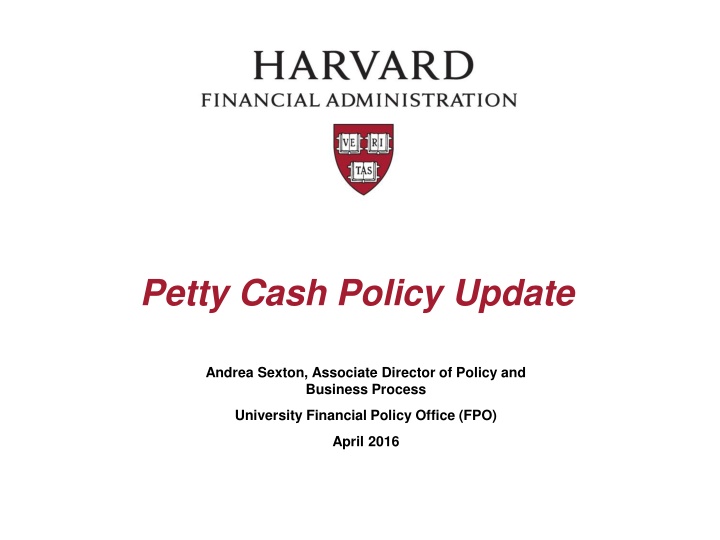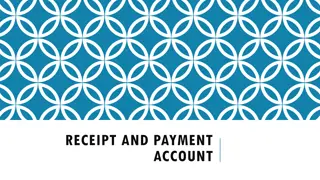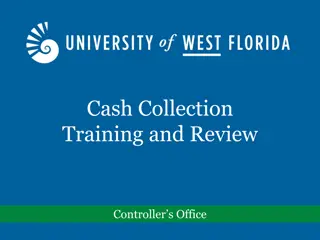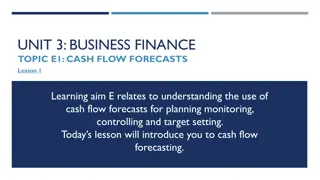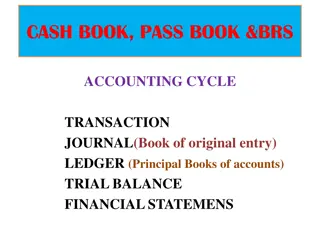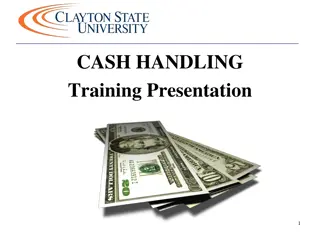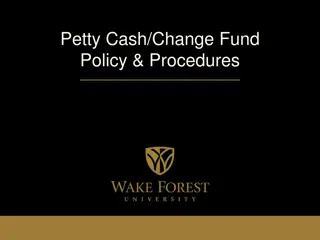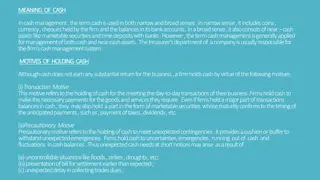Updated Petty Cash Policy Guidelines
Updated Petty Cash Policy Guidelines introduced by Andrea Sexton, Associate Director of Policy and Business Process at the University Financial Policy Office in April 2016. The key changes include new recommendations on the use and balances of petty cash accounts, streamlined procedures for account management, and detailed instructions for handling petty cash transactions. The policy emphasizes appropriate uses of petty cash, the designation of custodians for petty cash funds, and the establishment and safeguarding of petty cash accounts.
Download Presentation

Please find below an Image/Link to download the presentation.
The content on the website is provided AS IS for your information and personal use only. It may not be sold, licensed, or shared on other websites without obtaining consent from the author.If you encounter any issues during the download, it is possible that the publisher has removed the file from their server.
You are allowed to download the files provided on this website for personal or commercial use, subject to the condition that they are used lawfully. All files are the property of their respective owners.
The content on the website is provided AS IS for your information and personal use only. It may not be sold, licensed, or shared on other websites without obtaining consent from the author.
E N D
Presentation Transcript
Petty Cash Policy Update Andrea Sexton, Associate Director of Policy and Business Process University Financial Policy Office (FPO) April 2016
Petty Cash Policy Update Key Changes New recommendations on use and balances of Petty Cash accounts Streamlined procedures for opening and closing accounts New, detailed instructions for opening, closing, and making changes to accounts (Appendix A) A new Petty Cash Action Form (Appendix B) replaces send a request on department letterhead A revised Reconciliation and Replenishment Form (Appendix C) 2
Understand appropriate uses of petty cash Mechanism of last resort to access cash for payments, when other disbursement methods are impractical or cannot be used. Petty cash funds must not to be used as an operating fund, i.e., to pay invoices for goods or services, to pay salaries or wages, or to make advances or loans. May be used to make cash payments to human subjects in accordance with the Human Subject Payment policy. A Short-Term Operating Advance (STOA) may be a better choice for projects that last less than six months. Generally, petty cash accounts should not exceed $500. Petty cash funds used for human subject payments or other unique programmatic purposes may be higher depending on a department s specific needs, subject to Tub Finance Office approval. 3
Designate a petty cash fund Custodian Each fund must have a Custodian approved by the financial dean or equivalent (or designee). New Custodians and changes of Custodians must be documented on a Petty Cash Action Form and approved by the financial dean or equivalent (or designee). Custodians must be Harvard employees. 4
Establish the petty cash account Submit a Petty Cash Action Form signed by the Financial Dean or equivalent (or designee) and a Payment Request in HCOM to fund the petty cash account. Before completing the payment request (using object code 0013), preparers should contact their Tub Finance Office to determine if their tub has a designated Petty Cash approver. When completing a Payment Request using object code 0013, HCOM will populate with the preparer s default approver If the preparer s tub has a designated Petty Cash Approver, the preparers should manually change their default approver on this Payment Request to the designated Petty Cash Approver. HCOM will then automatically build an approval path that all the way up to Strategic Procurement for final approval. The check request is cut in the standard AP check process and is delivered by mail services to the Custodian s departmental address. 5
Safeguard the cash Keep petty cash funds in a secure area such as a locked drawer or small safe Ensure segregation of duties. Custodians should not self- approve replenishments or other changes to the petty cash account. Reconcile the log of petty cash expenses to the amount in the cash box at least quarterly, or monthly if the petty cash account is associated with sponsored funds. In the event of theft, the Custodian should notify his/her immediate superior as well as the University Police. 6
Document expenditures and replenish funds The local business unit Custodian is responsible for maintaining: A log of expenses on a Petty Cash Reconciliation and Request for Replenishment Form Receipts for each transaction, which may be subject to review by Risk Management and Audit Services. The Custodian is responsible for replenishing the account when a petty cash fund runs low. Replenishment with submission of receipts must be done at least quarterly. If sponsored funds have been used, replenishment must be done monthly. When petty cash funds are replenished, the total of the replenishment form cannot exceed the full balance of the fund. 7
Evaluate need for petty cash account annually At least once per year, departments must re- examine whether the petty cash account is still required to meet the department s business needs, or if alternative disbursement methods could suffice. Petty cash funds should be active. Inactive funds should be terminated by local units. Funds are considered inactive if they have no activity during a fiscal year. 8
Petty Cash Replenishing Notes Approver on replenishment sheet should be a supervisor/manager, but not themselves a high volume user of petty cash PR should have unique line items for each payout that match the lines of the replenishment sheet. Detail should be entered in the Business Purpose field this will then appear in the line detail of common financial reports. See example here . . .
Tub Finance Office Contacts Remember to contact your Tub Finance Office in order to open or close an account and also to change the Custodian. Harvard T.H. Chan School of Public Health Sharon Reine sreine@hsph.harvard.edu Gina Sanchez esanchez@hsph.harvard.edu Harvard Medical School Donna Cantillo donna_cantillo@hms.harvard.edu Vicky Wei Vicky_Wei@hms.harvard.edu 10
Questions? 11
